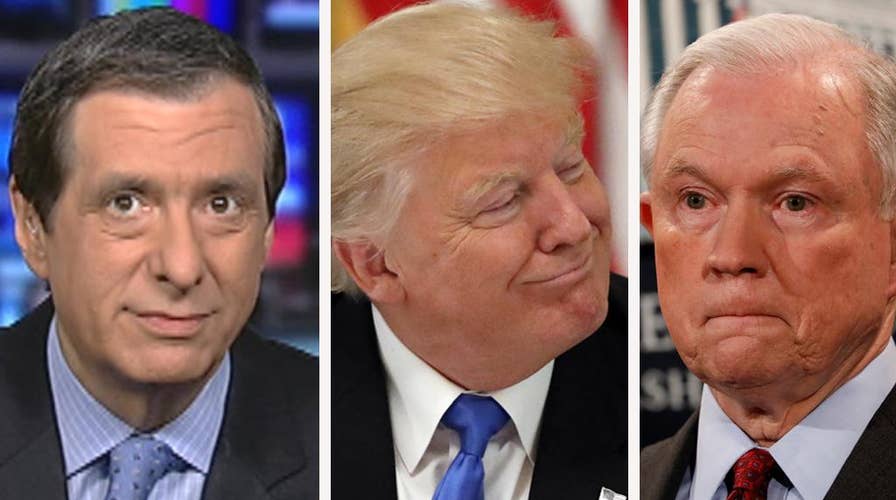Kurtz: Did President Trump throw his AG under the bus?
'MediaBuzz' host Howard Kurtz reacts to Donald Trump's candid New York Times interview where he stated he wouldn't have picked Jeff Sessions if he knew he would recuse himself over the Russia investigation
Donald Trump wishes he had never hired Jeff Sessions.
This comes not from some shadowy source or questionable leak, but from the president himself.
And it’s the president talking to three reporters from the New York Times, which he has repeatedly attacked and branded as fake news.
But Trump also knows it’s a prime forum for getting his message out, especially considering that he’s held one full-scale news conference during his six months in office.
So what are we to make of this extraordinary situation in which the president rips his own pick to run the Justice Department, while also taking shots at Jim Comey and Robert Mueller?
This anger at Sessions has been brewing for a long time. My sources told me months ago that the president felt blindsided when his AG recused himself from the Russia probe and believed the move was totally unnecessary.
As he told the Times: “Jeff Sessions takes the job, gets into the job, recuses himself, which frankly I think is very unfair to the president. How do you take a job and then recuse yourself? If he would have recused himself before the job, I would have said, ‘Thanks, Jeff, but I’m not going to take you.’ It’s extremely unfair — and that’s a mild word — to the president.”
In Trump’s view, the Sessions move had an unfortunate domino effect. The deputy attorney general, Rod Rosenstein, had to take over supervision of the Russia probe, and he appointed Mueller as special counsel, putting the president in the crosshairs of a mushrooming independent investigation. (Trump also took a swipe at Rosenstein for being from the heavily Democratic city of Baltimore, and having a conflict because he wrote the famous memo urging Comey’s firing.)
Trump also faulted Sessions for not recalling two past meetings with the Russian ambassador when he testified on the Hill: “Jeff Sessions gave some bad answers.”
Sessions was an Alabama senator who went out on a limb in endorsing Trump early and spent considerable time with him. He was, in other words, an integral part of the campaign.
So when the FBI started investigating allegations involving the campaign and possible collusion with Russia, Sessions was in an untenable position. He really had no choice but to remove himself from overseeing the probe. There are DOJ rules to be followed. Otherwise, he could have been continually hammered for a serious conflict of interest.
In the same interview, the president said Mueller would be in “violation” of his mandate if he started investigating Trump’s family finances, unrelated to Russia, but stopped short of saying he would fire the special counsel. And he said Comey had told him of an unsubstantiated Russian dossier on him, filled with what Trump called “made-up junk ... so that I would think he had it out there”—meaning, as leverage against him.
Trump’s lawyers cannot be happy about an interview in which he criticizes the attorney general, deputy attorney general, special counsel and former FBI director.
Sessions said yesterday that he’s “totally confident” he can keep doing his job effectively and will stay at Justice “as long as that is appropriate.”
The clear thread here is about loyalty. Keep in mind that Comey has said, and Trump has denied, that he asked for the FBI director’s loyalty before firing him.
But as the nation’s chief law-enforcement officer, Sessions has responsibilities that go beyond supporting the president who appointed him. And the attorney general has now been put in a difficult position.





